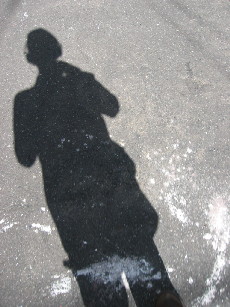Dave’s here in the satellite town of Bedford as a New Zealand pioneer, bringing with him hi-tech recycling equipment. He uses Luton’s easy connections to Europe to jump to a potential sale in the Netherlands or complete installation work on the company’s machinery in Italy. A salesman/technician/everything else for an expanding New Zealand export company, Dave has yet to find time for the cheap Spanish holiday deals. He’s not really one for vodka in the sun, instead relishing New Zealand’s relatively cheap manufacturing costs and technical know-how that ensure that his company’s industrial paper shredders are the top products on the market.
Dave’s running the European branch out of a tiny office in Bedford; but most days he’s out of the office, driving to every corner of the UK or travelling to overseas trade fairs. Alongside security, recycling is the top-growth industry of the time explains Dave as he clocks 24,000 miles in the six month old van.
Dave’s work situation, despite being stressful at times, beats the conventional story of finding a job in London. Every week hundreds of young Australians, South Africans and New Zealander’s join the confusing jostle for assistant-this-and-that’s; data-entry assistants, administrative assistants, assistant-producers, and anything else in which fresh-faced talent can be under-utilised.
Last week over beers on the pavement in the unseasonable September warmth of Camden, the conversation was a litany of bad jobs, unorganised workplaces and greedy employment agencies taking 3 pounds per hour off your wage. There seemed a general dissatisfaction, yet also an optimism and excitement that things would be on the up. This was simply the hard yards before the real stuff, the necessary pre-requisite for the imagined cool job around the corner.
The middle class drive to London is a manifestation of an insatiable lust for bettering ourselves, for fulfilling the high expectations that we’ve been loaded with since high school. There is a hope of being lifted to the top by a sympathetic top-dog, and a belief that such an off chance is at least more possible in this centre of commerce, culture, journalism, art, and education.
Recent GDP statistics tell us the British economy is rolling along with the highest growth rate in Europe. After being in the staid and organised countries of Western Europe, it is a statistic I found easy to believe among the thriving and chaotic scene I encountered at Stratford station, an East London gateway. Europe’s monocultural and uniformly moderately wealthy streets gave way to a vibrant and engaging city pulse.
The sheer mix of peoples from all over the globe contributes to this exciting and dynamic energy. New immigrants arrive daily from places as far flung as Poland, Nigeria and Russia. While most of the luggage on London’s airport conveyors contains naff Croatian souveniers and bad pastel tourist clothes, some of these bags are the 20kg baggage allowance that will start a new life.
These long-term arrivals aren’t casual adventurers prompted by a fellow Wellington bar-buddy shifting to the London big smoke, but poor people giving up everything that was at home to seek a better life in the rich world. Unfortunately, despite a growing economy, leaving Nigeria for London hardly ever comes with an eight pound an hour assistant office job. More likely it will be four quid an hour on the checkout or as a night shift construction worker.
Out late one night in central London, I paused to chat with a Nigerian guy guarding a building whose occupants he could not release information about. After breaking through the “piss-off-I-can’t-tell-you-anything” that came with the job description, I asked him about Nigeria’s capital, Lagos. He suggested I visit, me replying that I considered it a dangerous place for a white man. He chuckled, saying that for him London was a far more frightening place to be.
Considering the poor employment prospects, sub-standard housing estates and inadequate public transport that characterize black suburbs like Hackney, I agreed that London certainly can’t be a rosy place for all. It makes me wonder why they- why we- why I am here. It is an expensive, congested and dirty parasite. As early as the 1660’s outsiders observed a 20 mile wide and 1 mile high cloud of grime over London. Like any metropolis, London is a monster. It guzzles endless fresh prey, be it coal, humans or Italian buffalo mozzarella.
Despite being a monster, there’s something about London that proves irresistible. Being a participant in something so powerful and influential brings a type of exhilarating and addictive attachment. If not clean air, then at least one lives where the modern world is being made, wrought out in an endless collision and concoction of lifestyles, foods, music and ideas. To exist among such a diversity of people, people who through happenstance and imagination ended up in the same place, is to say the least…exciting.

